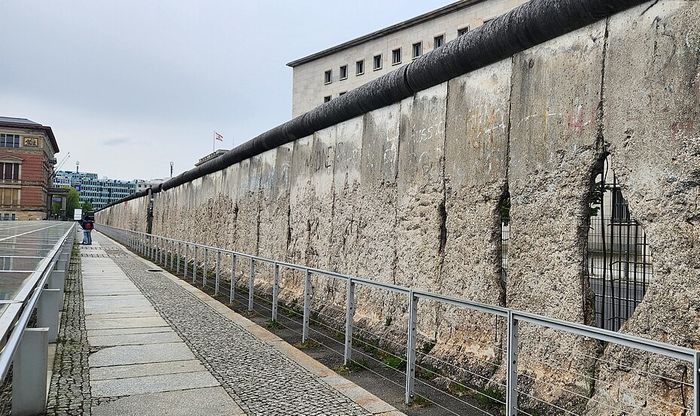Has the EasyJetification of Eastern Europe altered Britons’ relationship with the former Eastern Bloc?
Daisy Stewart Henderson argues that cheap holidays to the former Eastern Bloc indicates a historically unprecedented orientation to the West

I shrouded an eye roll when a group of fifteen men in matching t-shirts, advertising their stag do in Gdańsk, followed by the groom himself in a hot pink baseball cap emblazoned with a slogan not-to-be-repeated-in-print, boarded my airport bus. It was not until later that I considered the significance of their destination. A little over thirty years following the collapse of communism in Eastern Europe, the Iron Curtain has swung so far open that its former members now constitute popular drinking holiday destinations. Of course, this has been facilitated by the ample provision of cheap flights from the UK by airlines such as EasyJet and Ryanair.
Between 2019 and 2023, Poland was the UK’s 9th most popular outbound travel destination, while Romania and Hungary featured in the top 20: a level of mobility that would have been unfathomable just a few decades ago. But how has this altered Britain’s relationship with the region, and what is the role of even the rowdiest of ‘lads on tour’ in a long chronicle of complex geopolitical upheavals?
“Tourists fill up museums and restaurants in city centres, and, financial arguments aside, they provide a sense of connectedness with the West”
The mixture of passengers on my flight to Budapest encapsulated the diversity of motivations of those visiting Eastern Europe using low-cost air travel. I did my best to block out the rambunctiousness of the groups of young British men who had apparently been undeterred from a few pints in the Stansted Wetherspoons by the 6am take off time. Yet I could not help listening in to the sobering conversation of the Orthodox Jewish couple sitting beside me. They discussed plans to visit the neighbourhoods once inhabited by their ancestors, and see the sites of their persecution during the Holocaust.
This reminder of the city’s recent and harrowing history stirred my inner humanities’ student, yet any self-reflection I undertook was limited at best. Where did my friends and I fit into it all? As Cambridge students priding ourselves on our analytical stamina in history museums, were we embarking on a valiant mission of cultural learning in a city that holidaying in would have been unthinkable for our parents at the same age? Or were we unthinkingly drawn in by Ryanair’s affordable flights and the almost worryingly cheap Airbnb? And does it actually matter?
Obviously, British tourists have not transformed Eastern European countries. While English is widely spoken in many capital cities, and our favourite American fast food chains now operate out of communist-constructed shopfronts, every Eastern European nation I have visited proudly promotes their national identity first and foremost. This is seen through the damning denouncement of Soviet crimes against Latvia in Riga’s Museum of the Occupation or a map outlining where Hungary’s borders ought to be according to Orbánist nationalist rhetoric in the Hungarian Parliament.
“Even the most obnoxious of British lads bring money into economies decimated by decades of communist totalitarianism”
The enduring haunting of the region by the slain spectre of communism provides another complex dynamic. On multiple occasions, bus drivers in the Baltic states, upon recognising my hopelessly vacant stare when addressed in their vernaculars, switched to the assumed lingua franca: Russian. While Tallinn is steadfastly modern, a trip to Narva, Estonia’s third-largest city, felt like returning to the era of Khrushchev owing to its domination by post-war Soviet architecture and the ubiquitousness of the Russian language. But a walk to the city’s renowned mediaeval fortress, which faces an equivalent structure on the other side of the river, and above which the flag of the Russian Federation proudly flies, is a glaring sign of the times. With the complexity of this past and present, how can British tourists be anything but extremely irrelevant?
Because our very ability to visit many Eastern European states is profound. Even the most obnoxious of British lads bring money into economies decimated by decades of communist totalitarianism, though the resultant cheapness of beer may be their primary incentive for visiting. Tourists create jobs as they fill up museums and restaurants in city centres, and, financial arguments aside, they provide a sense of connectedness with the West. This represents the shifting trajectories of many Eastern European nations in a region shaped by the tumult of imperialist struggles which have come to feel grimly unending following the events of February 2022. Of course, cultural learning comes in greater quantities if you put in the hours in the museums, yet an observant eye and open mind remains the most powerful tool of exploration.
Perhaps drunken stag dos provide a different kind of exchange. While studiously pondering troubled histories definitely has its place, in a region which was so impenetrable for so long, there is a certain value in the visits of those with the least profound motivations imaginable. Their drunken diplomacy may just be a signifier of alignment with the West, as the sovereignty of small Eastern European nations once again appears to be under threat.
 News / CUP announces funding scheme for under-represented academics19 December 2025
News / CUP announces funding scheme for under-represented academics19 December 2025 News / Cambridge welcomes UK rejoining the Erasmus scheme20 December 2025
News / Cambridge welcomes UK rejoining the Erasmus scheme20 December 2025 News / SU reluctantly registers controversial women’s soc18 December 2025
News / SU reluctantly registers controversial women’s soc18 December 2025 Film & TV / Timothée Chalamet and the era-fication of film marketing21 December 2025
Film & TV / Timothée Chalamet and the era-fication of film marketing21 December 2025 News / News in Brief: humanoid chatbots, holiday specials, and harmonious scholarships21 December 2025
News / News in Brief: humanoid chatbots, holiday specials, and harmonious scholarships21 December 2025









